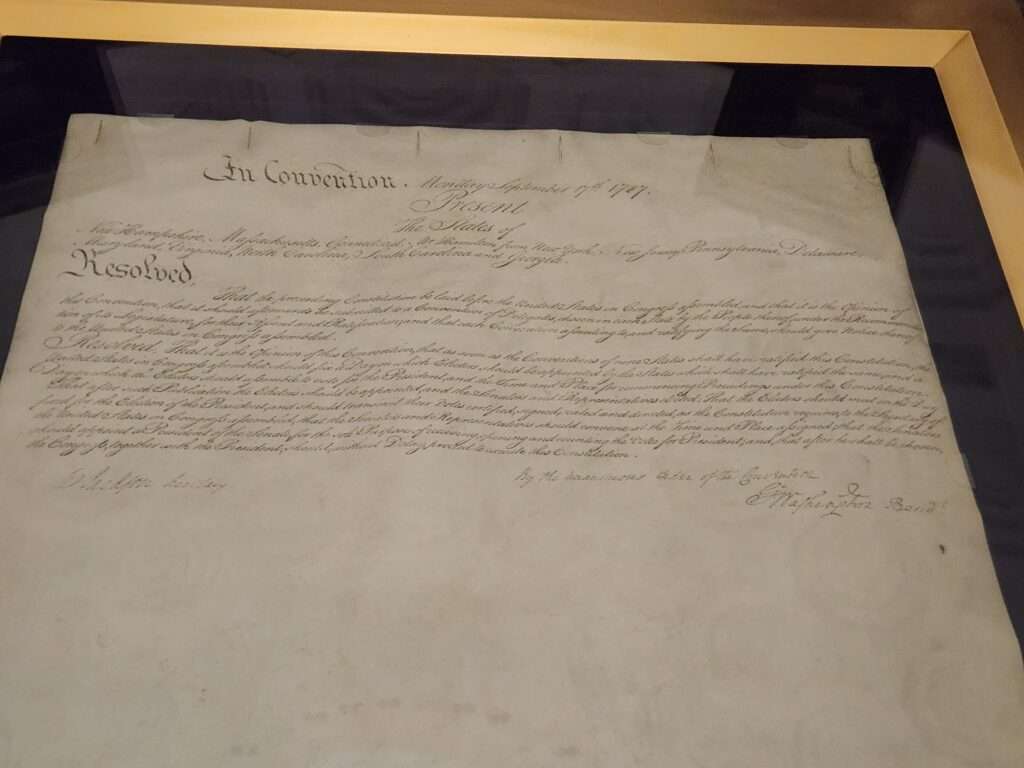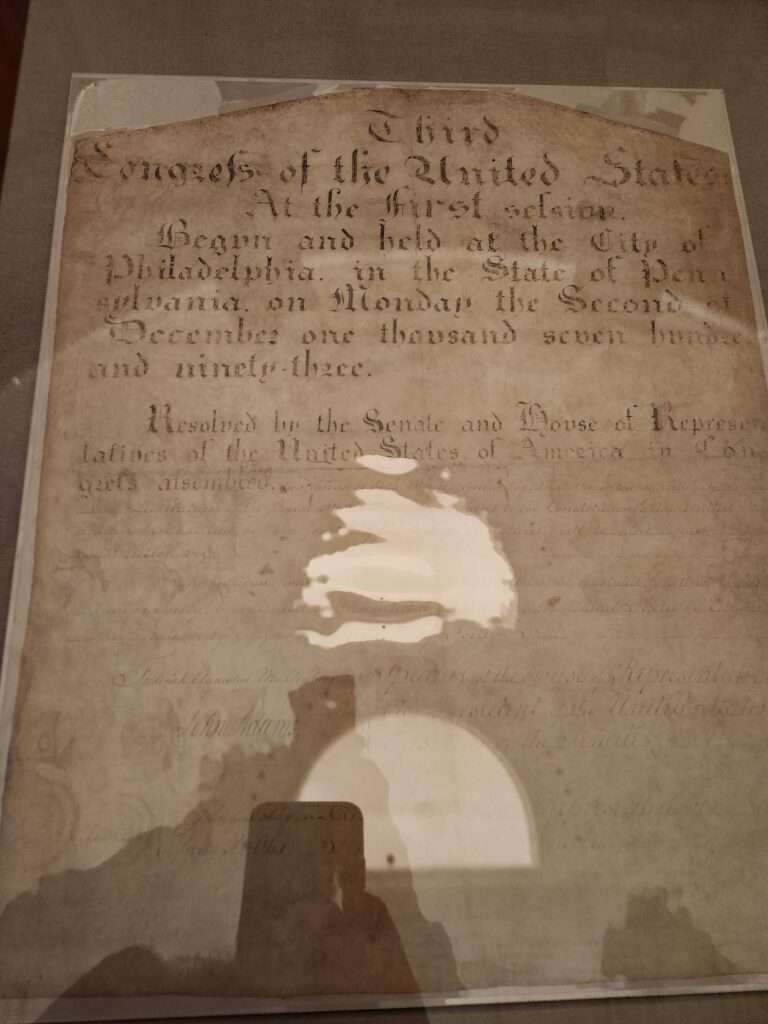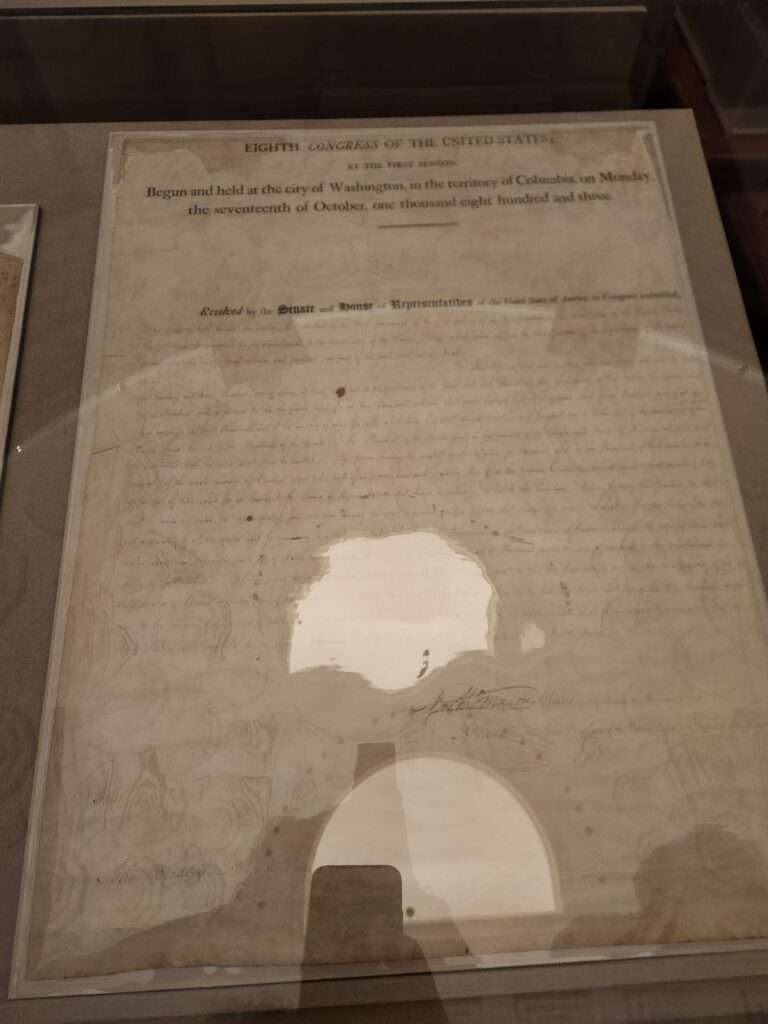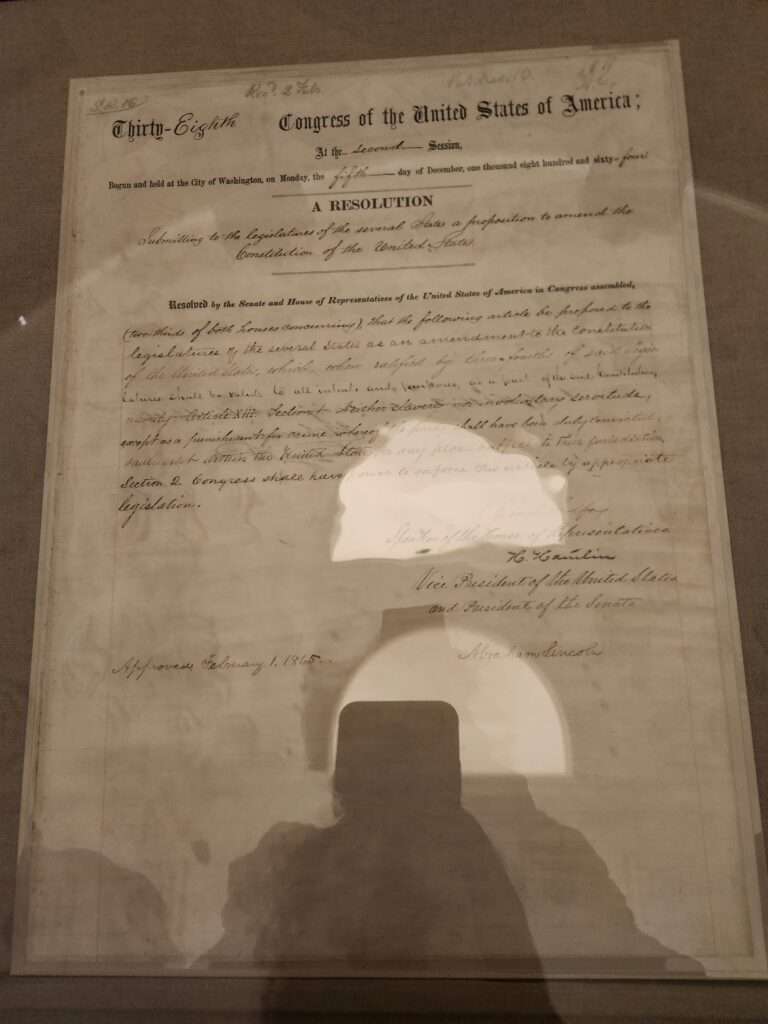The Volokh Conspiracy
Mostly law professors | Sometimes contrarian | Often libertarian | Always independent
See The Entire Constitution At The National Archives
The Constitution, the "Fifth Page," and all 27 Amendments are on display.
I have visited the Rotunda at the National Archives many times. On permanent display are the Declaration of Independence, the four pages of the Constitution, and the Bill of Rights. At this point, the Declaration is so faded, it is nearly impossible to read. Same for the Bill of Rights. Thankfully, the Constitution was better preserved. Every time I walk into the room, I am overcome by a sense of awe and wonder. I devote my life to teaching these documents, but it is a very different sensation to see them in person.
For the next month, the National Archives has put together a very special presentation: the "fifth page" of the Constitution is on display, along with all twenty-seven amendments. Today, I visited the Archives, and thoroughly enjoyed the new exhibit. The photographs, alas, are not good. The lighting creates a glare on the glass cases, which made them even more difficult to see.
The "fifth page" provided instructions to the states of how to ratify the Constitution. I labored about whether to include this text in the Heritage Guide to the Constitution. I ultimately decided not to, as it was not part of the ratified document, even though it was signed by George Washington, the President of the Convention.

I was struck by how large the proposed Eleventh Amendment was. The piece of parchment was nearly the size of the Bill of Rights.

The Twelfth Amendment had a formatted, printed header at the top. It was also a large piece of parchment.

The Thirteenth Amendment was written in very tight cursive, and took up barely half the page. It is noteworthy that President Lincoln signed the Thirteenth Amendment, even though Article V does not provide a role for the President in the amendment process.

The Fourteenth Amendment was not written on any sort of form, but was written in script on lined-paper.

The Sixteenth Amendment was the first amendment that was typeset. Much less dramatic.

I don't think I had ever seen the Twenty-Seventh Amendment before. It includes a fascinating narrative of how the amendment was originally introduced in 1789, but not ratified until 1992. 
Visit the Archives soon!
Editor's Note: We invite comments and request that they be civil and on-topic. We do not moderate or assume any responsibility for comments, which are owned by the readers who post them. Comments do not represent the views of Reason.com or Reason Foundation. We reserve the right to delete any comment for any reason at any time. Comments may only be edited within 5 minutes of posting. Report abuses.
Please to post comments


Been to the Archives 3 times, in 1983 when they had a room where you could listen to the Nixon tapes, except they only played one tape, with some Poindexter Historian telling you what you were listening to.
Went back in 1988, only to find they’d moved the tapes across the river to Arlington, in a nondescript Office Park, by that time they had them catalogued and you could pick and choose and listen at your leisure.
Again in 1993, they’d moved it to College Park MD, an actual Government building with guys with guns and Cameras, had to fill out a form saying you were a “Researcher” and go in a little cubicle with only a notepad.
Now you can listen online, the Watergate stuff is boring, I love the tapes where Nixons picking his All Time Baseball team. Or talking to LBJ about the Texas/Arkansas game
Frank
I share Prof. Blackman's awe of our country's founding documents and the people who created them.
Living in northern Virginia, I try to visit every 2 - 3 years.
Though it was never ratified, the very first amendment proposed for our Bill of Rights was intended to ensure that the House of Reps would forever grow along with the nation’s population. Unfortunately, an unexpected defect in its wording ultimately prevented its ratification. Read more about “Article the first”… https://thirty-thousand.org/article-the-first-of-the-bill-of-rights/
If you want to see “Article the first” in the original Bill of Rights legislation, along with the other 12 proposals, you can “zoom” into it on this webpage: https://thirty-thousand.org/zoomable-bill-of-rights-stonecut/ You can also see the "27th Amendment", which is proposed as "Article the second". Because it is huge, it's easier to view this document on a standard monitor. Use your cursor or the pull-down menu to zoom into each of the proposals.
Regarding President Lincoln signing the Thirteenth Amendment "even though Article V does not provide a role for the President in the amendment process", nor does it waive that requirement stated elsewhere in the Constitution. For more on this subject, read this paper by Joshi Sopan: https://scholarlycommons.law.northwestern.edu/nulr/vol107/iss2/18/ After all that bloodshed, Lincoln (who understood the Constitution well) obviously wanted to be sure this amendment was never challenged.
Modern electronic cameras, including cell phones, are like old school cameras, the flash is optional. Indeed, archivists probably don't even want flashes doing spot micro-fading of irreplacable artifacts. The glass coverings probably weed out the worst frequencies.
I personally recommend looking at the treasure map on the back.
If you want to see the whole Constitution, don't even bother going to the National Archives because you won't see it by staring at pieces of parchment or paper. That's not to say we shouldn't all go to D.C. to see the display. But look first at the two most significant SCOTUS decisions of this century (at least): Alden v. Maine in 1999 and Arizona State Legislature v. Arizona Independent Redistricting Comm’n in 2015 and the discussion of sovereignty in the opinions of Chief Justice John Jay and Justice James Wilson (and the argument of Edmund Randolph, who also was a Framer and then U.S. Attorney General) in Chisholm v. Georgia in 1793.
In Arizona, the majority opinion highlighted a crucial truth and a crucial source that isn't on display at the National Archives. They emphasized the self-evident truth that “the animating principle of our Constitution” is “that the people themselves are the originating source of all the powers of government.” “The people’s ultimate sovereignty had been expressed by John Locke in 1690.” “Our Declaration of Independence, ¶2, drew from Locke.”
They also quoted Locke for a crucial truth: any “Legislative” body (i.e., any state or federal legislature) has “only a Fiduciary Power to act for certain ends,” and “there remains still in the People a Supream Power to remove or alter the Legislative, when they find the Legislative act contrary to the trust reposed in them.”
Locke's Second Treatise of Government paragraphs 132, 134, 136 emphasized that whoever exercises the supreme legislative authority is sovereign. Our Constitution was designed according to the logic of Locke. In The Federalist No. 51, Madison emphasized, “In republican government, the legislative authority necessarily predominates.” At first glance, the most obvious “legislative authority” is Congress. That is true as far as it goes. As the Necessary and Proper Clause established, Congress predominates over the executive and judicial branches by having the power and duty to make all laws that are necessary and proper for governing the powers of the executive and judicial branches. But our Constitution established that the people (who "ordained and established" our Constitution) are the supreme legislative authority and sovereign.
SCOTUS in Alden and the authorities they discussed (especially Justice James Wilson's opinion in Chisholm v. Georgia) supplemented SCOTUS in Arizona and Locke in proving that the people are the supreme legislative authority and sovereign. In Alden, the majority and dissenting opinions discussed a profoundly important decision, Chisholm v. Georgia in 1793, all of which also explained how to see and prove that our Constitution clearly established the sovereignty of the people (which SCOTUS in other decisions regarding rights refers to as "ordered liberty").
James Wilson was the only person who signed both the Declaration of Independence and the Constitution and served on SCOTUS. He was responsible for starting our Constitution with its most profound and important words "We the People." Later, Justice Wilson wrote some of the most important, insightful words in any SCOTUS opinion. Justice Wilson succinctly explained and proved the great power of the Preamble. He emphasized that the most important word relevant to our Constitution wasn't even written into our Constitution. It was merely implied.
The heart and soul of our Constitution is only implicit in its text and structure: “the term SOVEREIGN” is not used in our “Constitution.” Chisholm v. Georgia, 2 U.S. (2 Dall.) 419, 454 (1793) (Opinion of Wilson, J.). But the Preamble is the “one place where it could have been used with propriety.” Id. Only those “who ordained and established” our “Constitution” could “have announced themselves ‘SOVEREIGN’ people of the United States.” Id.
The first and foremost separation of powers in our Constitution is between the sovereign people and all public servants. So “The PEOPLE of the United States” are “the first personages introduced.” Id. at 463. After introducing the sovereign (the people), the text and structure of Articles I, II and III further emphasized the people’s sovereignty. They introduced our directly-elected representatives (Congress), then, our indirectly-elected representative (the president), and, last, our unelected representatives (judges). The people “vested” only limited powers in public servants in and under “Congress” (U.S. Const. Art. I, §1), the “President” (Art. II, §1) and the “supreme Court” and “inferior Courts” that “Congress” was delegated the power to “ordain and establish” (Art. III, §1).
StarzBet'i mobilitesi nedeniyle seviyorum. Çok çalışıyorum ve her zaman bilgisayar başında oturmak için vaktim olmuyor. Uygulama sayesinde molalarda oyun oynuyorum. Kayıt işlemi starzbet giriş kolaydı, bonusları hemen aldım. Ödemeler hızlı geliyor ve sorularım olduğunda destek ekibi yardımcı oluyor. Oyunlar sıkılmayacak kadar yeterli.